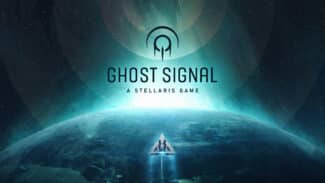Fast Travel Games unveiled its next first-party title today, called Ghost Signal: A Stellaris Game. It’s coming to Quest 2 in early 2023 and we’ve already got some hands-on impressions for you.
Developed in-house by Fast Travel Games, Ghost Signal is a roguelite action game set in Paradox Interactive’s Stellaris universe. In Ghost Signal, you’ll control a ship through outer space with gameplay featuring combat, narrative, resource-gathering and more. You can get a first look in the trailer above and more details in the description below, straight from Fast Travel Games:
Uncover the wonders of outer space in this VR action roguelite game. Set in the Stellaris universe, captain your ship to battle or befriend a multitude of alien species in your search for the enigmatic Ghost Signal. Partake in dynamic space wars, encounter planet sized creatures, gather valuable loot to conduct research, and more. Every journey offers new possibilities.
Ghost Signal is designed as a seated experience and the story mode plays out through roguelite runs, with each level of the run presented as a unique and randomized diorama-like environment laid out in front of you. In each environment, your ship is placed in the middle of a stunning space vista, but the contents of each varies significantly. Some are straight up combat encounters, while others will see you discover new items and upgrades or converse with aliens via dialogue options.

You’ll play through multiple runs and encounter different procedurally-generated environments, enemies and items each time, altering your ship’s capabilities with randomized upgrades and items you’ll discover along your way.
When it comes to combat, you can switch between three different weapons to target enemies, but you’ll need to balance weapon selection with positioning. Some weapons are more useful at close range, while others work best from a distance. Missiles, for example, can make a big impact on tough enemies from afar, but only have limited ammo per run – you’ll need to use them wisely.
Between levels, you can choose to upgrade your ship and its weapons or equip items that modify weapon behaviour, depending on your play style. You’ll find different items across each run and play through a randomized mix of encounters. It’s these mechanics that see Ghost Signal join an increasingly large selection of roguelites on VR platforms, but it also has some distinct elements that keep it feeling unique. The seated approach that uses diorama-like environments, for example, sets it apart as a more calming entry and less physically demanding than other roomscale roguelites, such as Ancient Dungeon or Until You Fall.

I played through a short run of Ghost Signal last month at Gamescom. It was a tantalizing look at what Fast Travel Games has in store, but I’ll hold off full judgement until I can play more. That being said, the environments were a highlight and the sci-fi visuals work well in diorama form. Likewise, the structure showed potential, but whether the game has legs will depend on how enjoyable it is over longer play sessions and multiple runs.
The control scheme also felt a bit at odds with the presentation – you pilot your ship from afar, by holding down the trigger and moving your controller to direct a small rod in the direction you want the ship to go. It will then follow the outlined path to completion, allowing you to stack multiple paths in quick succession. It took some getting used to and I was left wondering why I couldn’t just interact with the environment directly, reaching out into the diorama to select the area I wanted to pilot to.

All that said, Ghost Signal shows potential. Using the existing Stellaris IP is an interesting decision and the diorama setup feels reminiscent of successful tabletop games like Demeo. It will be exciting to see whether Ghost Signal finds an audience and fills a hole in the VR roguelike genre when it releases for Quest 2 in early 2023.





